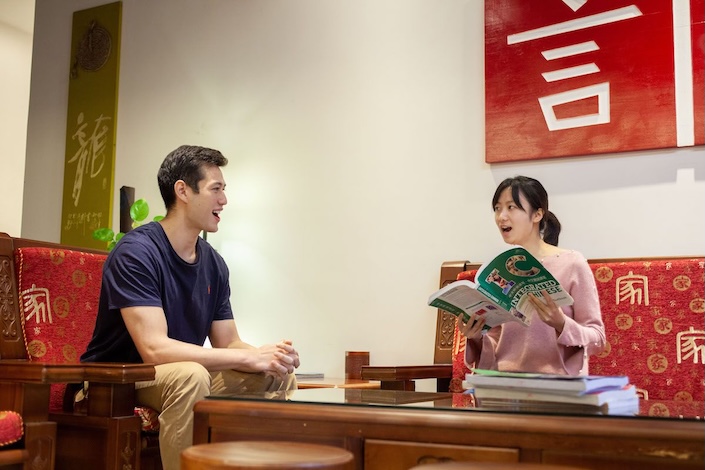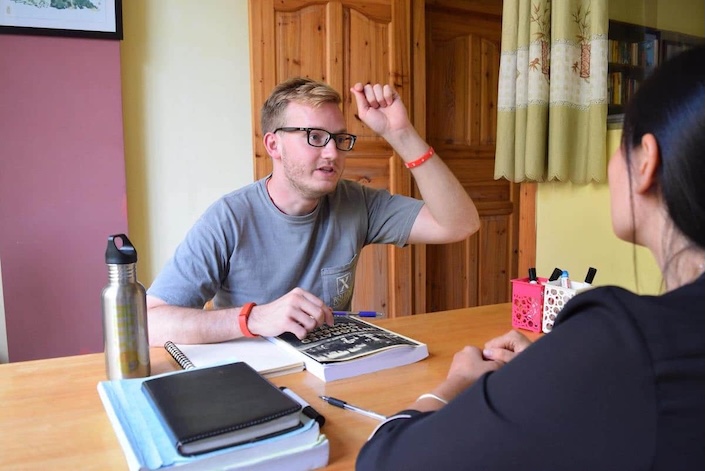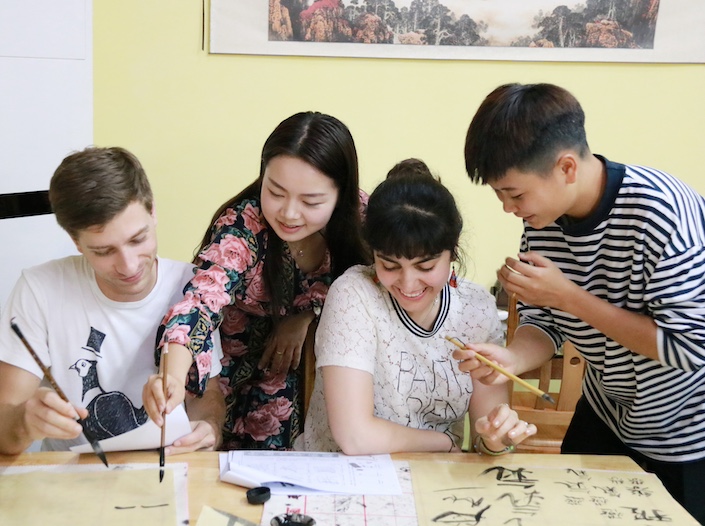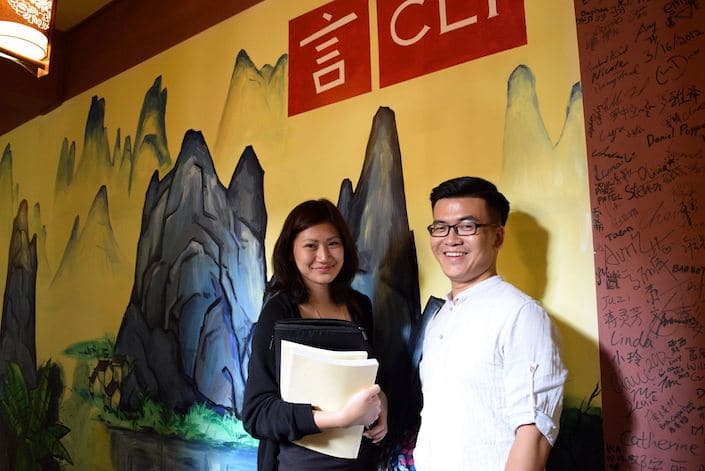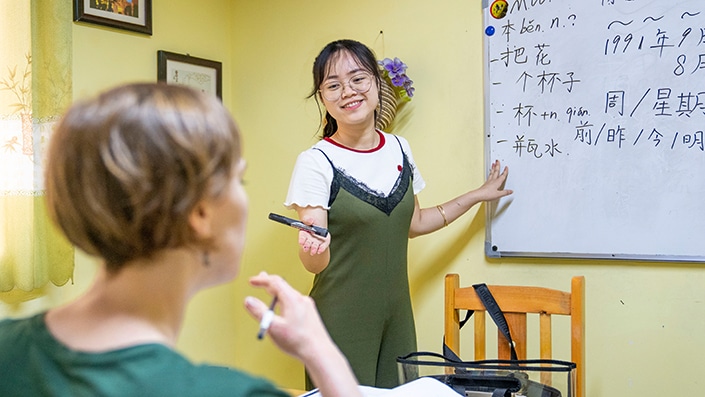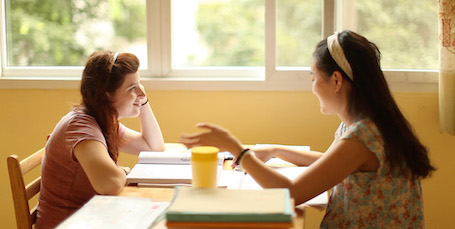A Brief Guide to Expressing Birthday Wishes in Chinese
 Anne Meredith
Anne MeredithLearn Chinese in China or on Zoom and gain fluency in Chinese!
Join CLI and learn Chinese with your personal team of Mandarin teachers online or in person at the CLI Center in Guilin, China.
Everybody loves birthdays, and China is no exception. So how do you say “happy birthday” in Chinese and how are birthdays celebrated in China, anyway?
We invite you to read on to find out! To all the birthday guys and gals out there, CLI wishes you 生日快乐 (🔈 shēngrì kuàilè)!
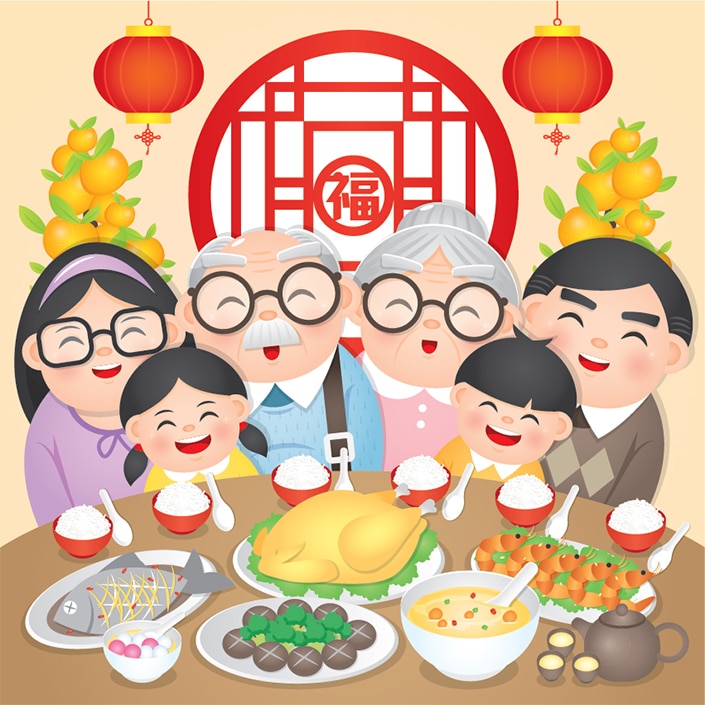
Table of Contents
- How Do You Say “Happy Birthday” in Chinese?
- Other Ways to Express Birthday Wishes in Chinese
- How Do You Sing the “Happy Birthday” Song in Chinese?
- Calculating Chinese Birth Dates: A Complex Endeavor
- Chinese Birthday Traditions
- Here’s to Many Happy Birthdays to Come!
- Chinese Vocabulary for Wishing Someone a Happy Birthday in Chinese
- Pinyin chart (so you can pronounce birthday wishes accurately)
- How to say “hi” in Chinese (useful for greeting guests at the party)
- How to say “yes” in Chinese and how to say “no” in Chinese (RSVPs and everyday conversation)
- Hongbao (红包) (a common birthday gift in China)
- Chinese table manners (especially helpful for birthday banquets)
How Do You Say “Happy Birthday” in Chinese?
The easiest way to say “happy birthday” in Chinese is 生日快乐, or “🔈 shēngrì kuàilè” in pinyin. The first part of this expression is 生日 (shēngrì) which means “birthday,” and the second is 快乐 (kuàilè) which means “happy.”
Thus, the expression 生日快乐 can be translated literally as “birthday happy.” Flip it around and you get “happy birthday!” You can’t go wrong by saying “生日快乐” to someone on their birthday.
At times, you might also hear Chinese people wishing each other a happy birthday by saying “祝你生日快乐” (zhù nǐ shēngrì kuàilè). This slightly more complex expression, which makes use of the characters 祝 (zhù) and 你 (nǐ), meaning “wish” and “you,” is just another way to say “happy birthday.” Translated literally, it says, “Wish you birthday happy.”
Other Ways to Express Birthday Wishes in Chinese
If you are hoping to say something a bit fancier than just “happy birthday,” you have a variety of expressions to choose from. Often, which expression you use depends on the age and gender of the person you’re addressing. Some of the more common ones are listed below:
For older people
祝您生日快乐,长命百岁!(🔈 zhù nín shēngrì kuàilè, chángmìngbǎisuì!)
Translation: “Happy birthday! May you live to be a hundred years old!”
Explanation: The first part of this greeting is the polite version of 祝你生日快乐 (zhù nǐ shēngrì kuàilè, meaning “happy birthday”) with the informal 你 (nǐ, “you”) changed to the more respectful 您 (nín, “you”). The second part, 长命百岁 (chángmìngbǎisuì), is an idiomatic expression which, according to Pleco, means “may you live to be a hundred years old.” This definition makes sense if you consider the fact that 长 (cháng) means “long,” 命 (mìng) means “life,” and 百岁 (bǎi suì) means “100 years old.”
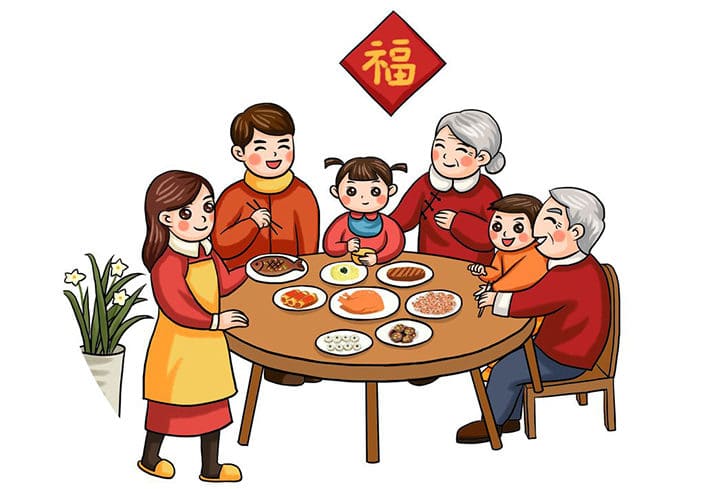
Older people in China enjoy a great deal of respect thanks to China's ancient tradition of filial piety.
For young women
祝你生日快乐,青春永驻!(🔈 zhù nǐ shēngrì kuàilè, qīngchūnyǒngzhù!)
Translation: “Happy Birthday! May you stay young forever!”
Explanation: The first part of this greeting is the informal version of 祝你生日快乐 (zhù nǐ shēngrì kuàilè), meaning “happy birthday.” The second part, 青春永驻 (qīngchūnyǒngzhù), is an idiomatic expression meaning “to stay young forever.”

“Happy Birthday! May you stay young forever!” is a good phrase for wishing a young woman a happy birthday.
For friends pursuing their career (any age)
祝你生日快乐,事业有成!(🔈 zhù nǐ shēngrì kuàilè, shìyèyǒuchéng!)
Translation: “Happy birthday! Wishing you professional success!”
Explanation: The first part of this greeting also exclaims “happy birthday!” The second part, 事业有成 (shìyèyǒuchéng), is a wish for achievement of professional success. This is evident when we consider that 事业 (shìyè) means “career” and 有成 (yǒuchéng) means “to achieve success.” If you want more everyday phrases like this, explore our guide to saying “yes” in Chinese (and other common conversational responses).
For friends around your own age
祝你生日快乐,天天开心,幸福美满!(🔈 zhù nǐ shēngrì kuàilè, tiāntiān kāixīn, xìngfúměimǎn!)
Translation: “Happy birthday! Hope you will be happy every day! May you achieve perfect happiness!”
Explanation: The first part of this greeting also says “happy birthday!” The second part, 天天开心 (tiāntiān kāixīn), is a relatively informal-sounding wish meaning “may you be happy every day!” The third part, 幸福美满 (xìngfúměimǎn), sounds a bit more formal and means “may you achieve perfect happiness.”
For children (any gender)
祝你生日快乐,学业有成!(🔈 zhù nǐ shēngrì kuàilè, xuéyèyǒuchéng!)
Translation: “Happy birthday! May you achieve success in your studies!”
Explanation: The first part of this expression also exclaims “happy birthday!” The second part, 学业有成 (xuéyèyǒuchéng), is an idiomatic expression which means “to be successful in one’s studies.”

Education is highly valued in Chinese culture, a fact that's reflected in birthday greetings used for children.
How Do You Sing the “Happy Birthday” Song in Chinese?
After learning to say “happy birthday” in Chinese, you might be wondering whether it’s common to sing the happy birthday song in China and if so, how to sing it.
Although there was no tradition of singing the happy birthday song in the past, both the tradition and the melody of this familiar song have been borrowed from the West and singing it at birthday parties is now quite popular.
If you’ve mastered the phrase, “祝你生日快乐” (zhù nǐ shēngrì kuàilè), you already know everything you’ll need to sing the happy birthday song!
All you need to do is sing “zhù nǐ shēngrì kuàilè” four times to the tune of the familiar English-language birthday song.
Calculating Chinese Birth Dates: A Complex Endeavor
While some of the traditions surrounding Chinese birthdays are changing, many aspects are still deeply influenced by traditional Chinese culture.
Due to the continuing popularity of the traditional Chinese lunar calendar, calculating Chinese people’s ages and birth dates is often quite complex.
A different way of determining age
The traditional Chinese way of calculating age is different from the Western method. According to traditional Chinese age calculation methods, children are already one year old at birth. This tradition explains why in China someone who is 21 if you calculate their age from the year that they were born will sometimes insist that they are actually 22.
In addition, people are traditionally believed to turn one year older on the first day of the Chinese Lunar New Year. Thus, even if someone’s 21st birthday is not until June, their older relatives may start saying they are 22 on the first day of the Chinese New Year even if that day falls in January.
Interestingly, these traditional methods can result in your Chinese friends being one and sometimes even two years older than the age they tell you they are, so watch out! Your Chinese friend who says she is 23 may actually be 22 or even 21 if you calculate her age from the year of her birth using the familiar Western method.
So many birthdays, so little time
The use of the traditional Chinese lunar calendar, or 农历 (nónglì), is still quite popular in China, although the familiar Gregorian calendar, or 阳历 (yánglì), is now widely used for official purposes.
Every Gregorian calendar date has a different corresponding Chinese lunar calendar date that changes every year. You can use an online calendar conversion tool to convert dates from one calendar to another.
The lunar birth date is very important in China and many Chinese people still celebrate their birthdays according to this method of tracking time. However, the official birthdate used on Chinese identity cards (身份证, shēnfènzhèng) is always calculated using the Gregorian calendar.
Since the Gregorian calendar was not widely used in the countryside until recently, when officials issued official ID cards for those living in the countryside, they sometimes misrecorded people’s birthdays, which resulted in one person having two and sometimes three different dates of birth.
Let’s consider a real-life example. 小王 (Xiǎo Wáng) grew up in a village only knowing his lunar Chinese birth date, which is November 1, 1988 (农历11月初1, nónglì shíyīyuè chūyī).
When officials came to the village to create Xiao Wang’s ID card, they didn’t bother to ask if the date he gave them corresponded to the lunar or Gregorian calendar. Instead, they simply recorded his official birthdate as November 1, 1988 on the Gregorian calendar.
Unfortunately, however, the correct corresponding Gregorian calendar date for the lunar calendar’s November 1, 1988 is actually December 9, 1988. Thus, he now has three different birthdays: November 1 and December 9 on the Gregorian calendar, plus November 1, 1988 on the lunar calendar, which he considers his “real” birthday.

Western and Chinese friends meet each other at the Chinese Language Institute (CLI) in Guilin, China and celebrate many birthdays together!
The importance of the Chinese zodiac
If you find the above explanations confusing, you might find comfort in the fact that there is a relatively easy way to tell a Chinese person’s approximate age using the Chinese zodiac, which is a traditional 12-year astrological calendar based on lunar phases.
Since the cycle of 12 animals repeats every 12 years and the order never changes, if Xiao Wang tells you he was born in the Year of the Dragon, knowing the order of the zodiac animals and which animal’s year you are currently in would allow you to quickly calculate that he was likely born in 1988 (or 2000 or 1976, depending on how young/old he looks!).

Each Chinese zodiac year is associated with one of the 12 Chinese zodiac animals.
Chinese Birthday Traditions
Now that you’re familiar with how to say “happy birthday” in Chinese and understand the concept of Chinese lunar birth dates, what happens if you get invited to a birthday party? How much do you know about how Chinese birthdays are actually celebrated? Read on to learn what to expect.
Noodles, not cake!
Although eating Western-style birthday cake is becoming more common, many people still eat traditional foods along with or instead of cake on this special day.
One of the most common Chinese birthday traditions is to eat a big bowl of “longevity noodles.” In Chinese, these “longevity noodles” are referred to as either 长寿面 (chángshòumiàn) or just 寿面 (shòumiàn) and are thought to represent long life.
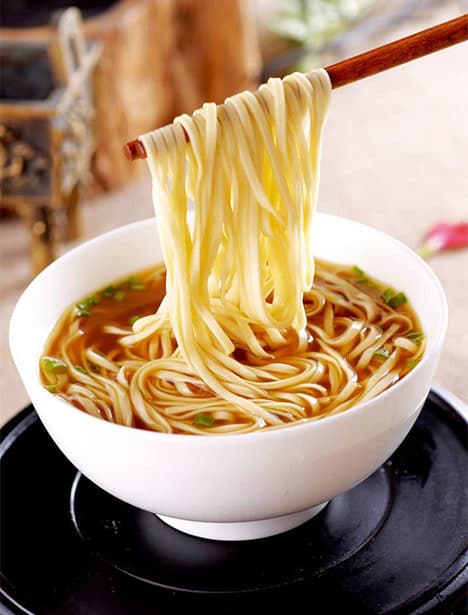
Longevity noodles are a traditional birthday treat in China.
Lucky red underwear
Another interesting Chinese birthday custom is the tradition of wearing red underwear during one’s zodiac year, or 本命年 (běnmìngnián), which is the year corresponding to the year of the Chinese zodiac in which one was born.
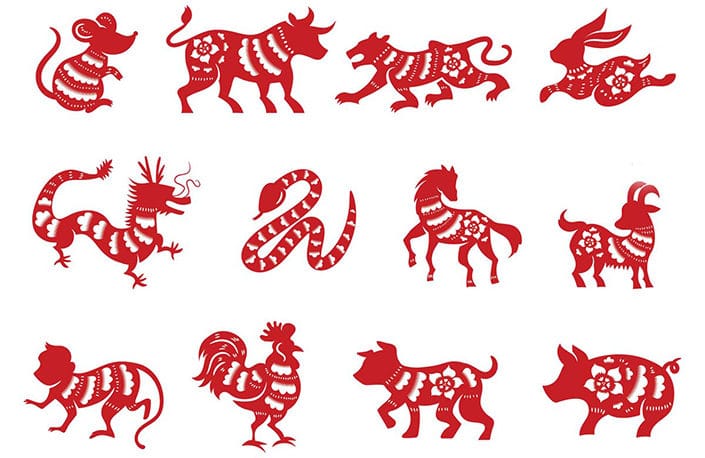
Chinese zodiac animals are an important part of Chinese birthday culture.
Let’s return to the example of Xiǎo Wáng to see how this works. He was born in 1988, the Year of the Dragon. Thus, he should wear red underwear in each subsequent dragon year (2000, 2012, 2024, and so on).
Since red is considered a lucky color, it is believed that wearing it will help ward off bad luck.
Gift ideas
Giving birthday gifts, or 礼物 (lǐwù), is common in China. However, there are some things you should remember when it comes to gift-giving in China. For example, it is a good idea to wrap gifts in red paper.
Chinese red envelopes, or hongbao (红包 hóngbāo), containing a few $20 USD or ¥100 RMB notes are also a very popular gift on birthdays in China.
Other bright, festive colors are fine, too, but avoid using black or white as they are associated with death and mourning.
Gift etiquette
If someone in China gives you a gift, keep in mind that it’s considered rude to open it in front of the giver. Also remember that it’s not a good idea to give a Chinese person a clock.
This is because the phrase for “give a clock” in Chinese, 送钟 (sòng zhōng), sounds the same as another phrase, 送终 (sòng zhōng), which means to pay one’s last respects to someone who is dead or dying.
Another gift to avoid giving is a green hat. This is because the phrase “to wear a green hat,” or 戴绿帽子 (dài lǜ màozi), means that someone’s wife is cheating on them. If you want more examples of this kind of wordplay, you’ll enjoy our guide to Chinese idioms (成语).
Here’s to Many Happy Birthdays to Come!
Chinese birthdays are fascinating events that are steeped in tradition. If you have a chance to attend one, we hope you now feel more confident that you can wish the birthday boy or girl happy birthday in Chinese and avoid confusion if you happen to witness him or her eating longevity noodles instead of cake!
Now that you know how to wish someone "happy birthday," why not learn to accept your next birthday invitation in style by exploring common ways to say "yes" and "no" in Chinese?
And once that invitation is in hand, you'll want to learn to greet all the other birthday guests with the help of our list of 12 ways to say "hi" in Chinese.
Last but not least, consider preparing for your next Chinese birthday dinner by checking out our list of tips on Chinese table manners. Enjoy!
Chinese Vocabulary for Wishing Someone a Happy Birthday in Chinese
| Hànzì | Pīnyīn | Definition |
|---|---|---|
| 生日快乐 | shēngrì kuàilè | happy birthday |
| 祝你生日快乐 | Zhù nǐ shēngrì kuàilè! | Wishing you a happy birthday! |
| 长命百岁 | chángmìng-bǎisuì | may you live to be a hundred |
| 青春永驻 | qīngchūnyǒngzhù | to stay young forever |
| 事业有成 | shìyèyǒuchéng | achieve professional success |
| 天天开心 | tiāntiān kāixīn | happy everyday |
| 幸福美满 | xìngfú měimǎn | perfect happiness |
| 学业有成 | xuéyèyǒuchéng | to be successful in one’s studies |
| 农历 | nónglì | the Chinese lunar calendar |
| 阳历 | yánglì | the Gregorian calendar |
| 长寿面 | chángshòumiàn | longevity noodles |
| 本命年 | běnmìngnián | traditional birth year according to the Chinese zodiac |
| 礼物 | lǐwù | gift |
| 过生日 | guò shēngrì | celebrate one's birthday |

Anne Meredith holds an MA in International Politics and Chinese Studies from the Johns Hopkins School of Advanced International Studies (SAIS). As part of the graduation requirements for the program, Anne wrote and defended a 70-page Master's thesis entirely in 汉字 (hànzì; Chinese characters). Anne lives in Shanghai, China and is fluent in Chinese.









